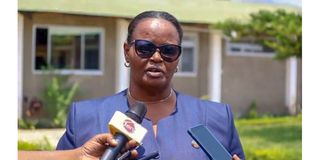Iringa steps up HIV prevention amid declining rates

Iringa Regional Medical Officer (RMO), Dr Sylvia Mamkwe. PHOTO | FRIDAY MMBAYA
What you need to know:
- The region's success is largely attributed to effective health service delivery in health centres and communities, coupled with strong partnerships with non-governmental organisations (NGOs) that support healthcare workers in handling HIV-related issues
Iringa. Authorities are intensifying efforts to reduce HIV infections, a major health challenge in Iringa region.
The initiatives emphasise expanding access to quality health services, raising awareness of reproductive health and promoting testing and counselling.
Speaking to The Citizen on September 23, 2024, Iringa Regional Medical Officer (RMO), Dr Sylvia Mamkwe, highlighted one of the key strategies: the provision of affordable antiretroviral drugs (ARVs), especially in rural health centers.
“The government has launched various campaigns to encourage citizens to regularly check their health, involving community groups and local leaders to spread the message widely,” Dr Mamkwe said.
According to the Tanzania Impact Health Survey (THIS 2022), HIV prevalence in Iringa has decreased slightly, standing at 11.1 percent, down from 11.3 percent in 2016/17.
Dr Mamkwe attributed this decline to ongoing testing and intervention efforts.
“Testing is ongoing at healthcare facilities, and the infection rate has decreased to 11.1 percent. Furthermore, infections among pregnant women, monitored through antenatal, postnatal, and labour clinics, have dropped to 0.9 percent,” she added.
These initiatives align with national and international goals of achieving the “95-95-95” targets, which aim to ensure that 95 percent of people know their HIV status, 95 percent of those diagnosed are receiving treatment, and 95 percent of those on treatment have achieved viral suppression.
“We have surpassed the first 95 percent, ensuring that over 95 percent of people in the region know their HIV status. For the second target, over 95 percent of those diagnosed with HIV are receiving treatment, and 98 percent of those on treatment have achieved viral load suppression,” Dr Mamkwe explained.
The region's success is largely attributed to effective health service delivery in health centres and communities, coupled with strong partnerships with non-governmental organisations (NGOs) that support healthcare workers in handling HIV-related issues.
International organisations such as USAID Afya Yangu Southern Zone, USAID Kizazi Hodari, HJFMRI-Walter Reed, and the Benjamin Mkapa Foundation (BMF) have played crucial roles, providing support through community health workers (CHWs).
Apart from health service delivery, the government has invested in community education through media campaigns to raise awareness and promote preventive measures, contributing to the observed decrease in new HIV infections in Iringa.
Dr Mamkwe acknowledged the higher prevalence of HIV among women, explaining that women are biologically more vulnerable to the infection, though they are more proactive in seeking health services.
She urged religious leaders to play a role in promoting medication adherence and health education within their communities.
Ester Sanga (not her real name), a 41-year-old woman living with HIV, shared her experience, demonstrating that an HIV diagnosis is not the end of life.
Diagnosed in 2004, Sanga has lived with the virus for 20 years and has thrived.
“I am a 41-year-old mother with a 20-year-old daughter. Being diagnosed with HIV means staying on medication and attending clinic appointments,” Sanga shared.
Her daughter, born HIV-negative, is now pursuing higher education.
Sanga, who now works as a CHW, uses her experience to inspire others and emphasises the importance of medication adherence. She encouraged those living with HIV to begin treatment immediately, reduce alcohol intake, and avoid drug resistance by following medical advice.
Meanwhile, the Tanzania Media Women’s Association (Tamwa) recently launched the Media Science Café project in partnership with the US-based organisation AVAC.
The project aims to equip journalists with knowledge to report accurately on health and science matters, particularly HIV/AIDS.
“The Media Science Café project brings together journalists and health experts to improve the accuracy of media reports on health issues,” Head of Projects and Strategy at Tamwa, Sylvia Daulinge, said.
With 37 years of experience in Tanzania, Tamwa focusses on empowering women and children in areas of justice and health.
These collaborative efforts represent a significant step forward in the fight against HIV in Iringa, promoting awareness, prevention, and improved access to treatment.



